Siberian Husky

Independent. Outgoing. Built for Adventure.
If you’re the proud parent of a Siberian Husky, you already know—this breed brings energy, charm, and a touch of wild spirit into your life. Known for their striking eyes, graceful gait, and friendly demeanor, Huskies are captivating companions for active families and seasoned dog lovers alike.
Why People Love Huskies
Born to Explore: Siberian Huskies are natural adventurers. Originally bred to haul sleds across the frozen tundra, these dogs are built for stamina, speed, and rugged outdoor life. If you love hiking, running, or cold-weather playtime, your Husky will be your most enthusiastic partner.
Friendly & Social: Don’t let their wolf-like appearance fool you—Huskies are known for being affectionate and playful. They love children, generally get along with other dogs, and enjoy being part of the pack (that’s you!).
Clean & Quiet: Huskies tend to have very little “doggy odor” and are fastidious about their grooming. While not known to be big barkers, they do love to “talk”—with charming howls, whines, and vocalizations that sound almost human.
Things to Keep in Mind
- Escape Artists: Huskies are clever and determined, especially when bored. If left alone too long or under-stimulated, they may dig, chew, or Houdini their way out of a fenced yard. A secure outdoor space and lots of exercise are essential.
- High Prey Drive: That squirrel in the yard? Fair game. Huskies have strong hunting instincts and may not mix well with small pets like rabbits or cats unless raised with them from a young age.
- Training Takes Patience: Huskies are intelligent, but their independent nature means they can be stubborn. Positive reinforcement training and early socialization are key to raising a well-mannered Husky.
Where They Came From
Siberian Huskies were bred by the Chukchi people of northeastern Asia, who relied on them to pull sleds and keep them warm at night. They arrived in Alaska during the gold rush and quickly gained fame as heroic sled dogs, including their role in the 1925 serum run to Nome. Today, they continue to charm dog lovers with their beauty and endurance.
Lifespan & General Health
Siberian Huskies are typically healthy and live about 11–14 years. They need regular vet care, a high-quality diet, and daily exercise to thrive. Because they were bred for cold climates, they’re more comfortable in cooler temperatures and should be watched carefully in summer heat.
Genetic Health Concerns for Huskies
- Eye Issues (Cataracts, Glaucoma, Corneal Dystrophy)— Huskies are prone to a range of eye problems. Cataracts may cloud their vision with age. Glaucoma can cause severe pain and blindness if untreated, while corneal dystrophy may create a crystalized appearance on the eyes. Annual eye exams can catch issues early.
- Von Willebrand’s Disease & Bleeding Disorders— This inherited blood clotting disorder can go unnoticed until surgery or injury. Pre-surgical blood testing helps ensure safe procedures.
- Seizures (Idiopathic Epilepsy)— Huskies can be prone to epilepsy, typically developing between 6 months and 3 years old. While it’s scary to witness, seizures can usually be managed with long-term medication.
- Laryngeal Paralysis— Older Huskies may struggle with breathing due to weakening vocal cords. If your dog develops noisy breathing or collapses during exercise, call your vet right away.
- Heart Conditions— From murmurs to structural abnormalities, Huskies may face heart issues—some detectable only through X-rays or echocardiograms. Regular checkups are your best defense.
- Hip Dysplasia— This inherited joint condition affects mobility and causes arthritis. Signs include limping or difficulty rising. Maintaining a healthy weight and regular exercise are critical for joint health.
- Inflammatory Bowel Disease (IBD)— Chronic vomiting, diarrhea, or weight loss may signal IBD, an immune-related gut condition. Diagnosis may require biopsy, but treatment with diet and medication often helps manage symptoms.
- Degenerative Myelopathy— Similar to ALS in humans, this progressive nerve disease affects coordination and strength in the hind legs. Physical therapy and early detection are key.
- Autoimmune Skin Issues (Pemphigus, Zinc-Responsive Dermatosis)— Huskies are prone to skin problems like crusty lesions, hair loss, and irritation. These often respond well to special shampoos, sun protection, or zinc supplements.
- Uveodermatologic Syndrome— This rare condition causes pigment loss and eye inflammation. It may lead to blindness if untreated. Huskies with pale skin around the nose or changing eye color should be examined.
- Cancer in Senior Years— As Huskies age, they become more susceptible to cancers. Regular exams and early removal of lumps or masses can lead to better outcomes.
- Hypothyroidism— This hormonal imbalance can cause weight gain, dull coats, or sluggishness. Easily diagnosed with a blood test and treated with daily medication.
- Ectopic Ureter & Urinary Incontinence— Some Huskies are born with misplaced urinary tubes that cause constant leaking. If diagnosed early, surgery is often curative.
- Hyperphosphatemia (Elevated Liver Enzymes)— Often symptomless, but detected through bloodwork. It may indicate liver inflammation or other underlying issues.
Final Thoughts
The Siberian Husky is a breed like no other—full of personality, beauty, and spirit. With the right balance of structure, exercise, and love, your Husky will be a joyful and loyal companion for years to come.
Ready to Learn More? We’re Here to Help!


